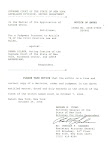By MITCHELL ROSEN
It is almost impossible to know if a child has truly been victimized by parental alienation syndrome (PAS). There is no test for it, no X-ray can be examined and lengthy psychological evaluations have a certain amount of subjectivity regardless of the clinician's efforts to be impartial.
Assuming a parent is able to convince the court his or her child has been manipulated into hating him or her, then what? If the child is 15, 16 or 17 years old, the chances of reversing the alienation are not great. Just hearing from a court-appointed psychologist that alienation has occurred would not take away the child's anger, mistrust and apprehension.
If the alienated parent is successful in educating the court that he or she has been unfairly separated from a child, he or she then faces the choice of either leaving the child with the parent responsible for the alienation or risking further estrangement by forcing the child to move.
Switching custody to the estranged parent, completely and suddenly, is referred to as immersion therapy. The child is immersed into the custody of the parent he or she has been taught to fear. Not only is the child in the care of a parent he or she may not have seen for years, but an essential part of the therapy is to either limit or stop any contact with the parent the child has known as the "good" parent.
For immersion therapy to be successful, the alienating parent must either be denied any contact or have all interactions with the child monitored and supervised so further alienation cannot take place.
A therapist skilled in working with alienated children monitors all discussions about the family. It may take months, maybe even close to a year, before the child exhales and relaxes into the care of the parent he or she used to loathe and fear.
The good news is that it is possible to reverse alienation. The child must also be given individual therapy to sort through the myriad of feelings he or she will experience when understanding how the once-trusted parent could have violated his or her trust so completely.
Each child responds differently. Some, especially younger children (younger than 10), may be able to adapt fairly quickly. Other children may need an inordinate amount of reassurance, patience and stability, with no outbursts of parental anger. Rages from the formerly estranged parent will only reinforce the notion that the child should fear the parent, that he or she really is emotionally out of control. The parent should remember this is a time when the child needs stability and consistency above all else.
No therapist who makes a recommendation for immersion therapy does so easily. The consequences are grave and the risks considerable. The only thing that could be worse would be to leave an innocent child with a parent so emotionally ill that the child will learn most of life's lessons backward.
Mitchell Rosen, M.A., is a licensed marriage and family therapist with practices in Corona and Temecula. Contact him at family@PE.com
Subscribe to:
Post Comments (Atom)























No comments:
Post a Comment